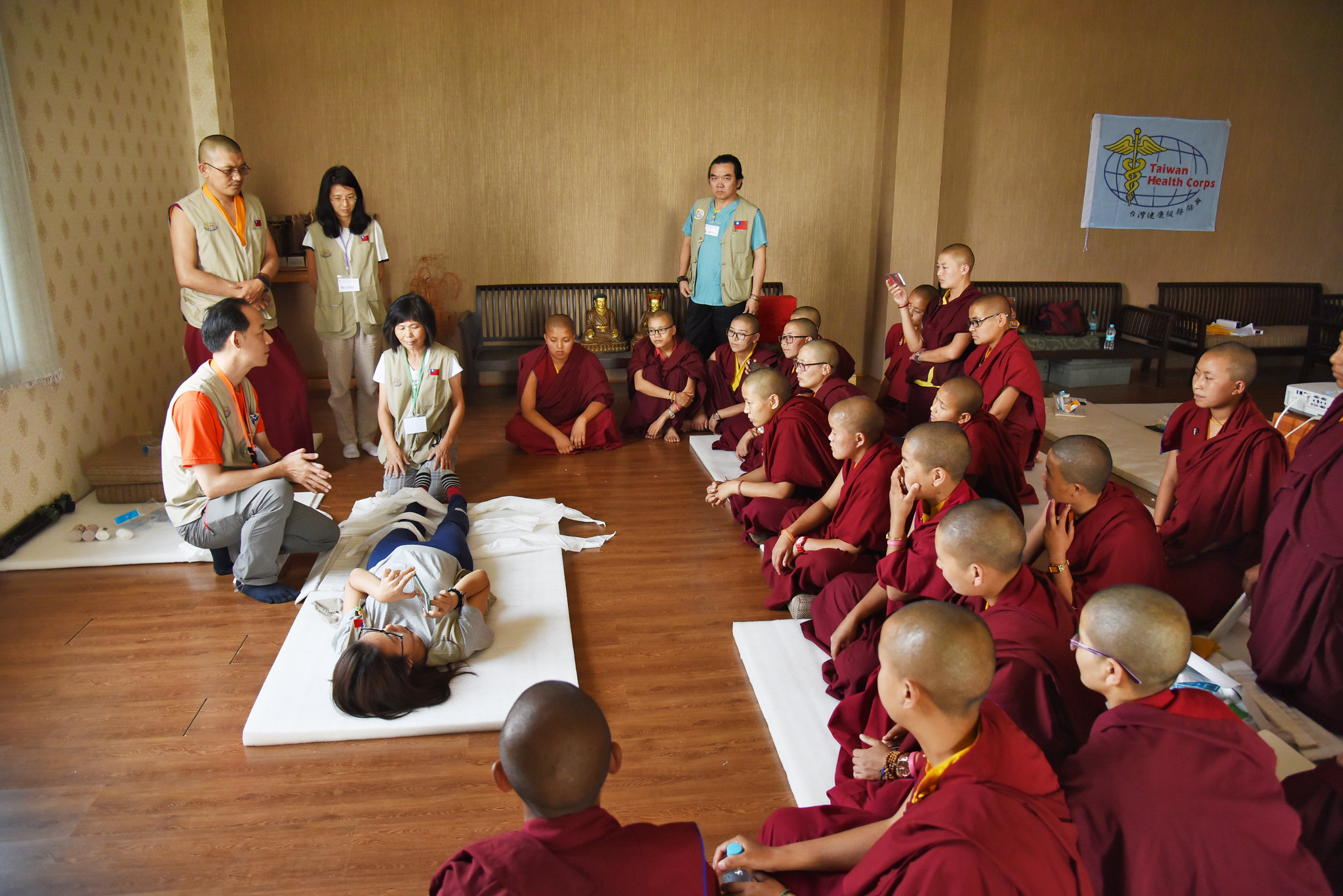Monlam Pavilion • March 14, 2017 | For the third year in succession, the Taiwan Health Corps has been working with Kagyu nuns during the Arya Kshema Winter Dharma Gathering.
Twenty-one nuns from eight nunneries—Ralang, Tilokpur and Palpung Yeshe Rabgye Ling in India, Karma Leksheyling, Tara Abbey, Osel Karma Thekchöling and Samten Ling in Nepal, and Drubde Palmo Chökyi Dingkhang in Bhutan—have successfully completed a nine-day training in basic health care.
Dr Jeffrey Chen, CEO of the Taiwanese based NGO Taiwan Health Corps, first responded to a request from the Gyalwang Karmapa to develop initiatives to improve the health and healthcare of nuns more than three years ago. This year he has returned for a third time with a team of six health professionals to provide basic training for a new batch of nuns. The team comprises Professor Kuo Su Chen, a specialist in Women’s Health, Dr Chin Min Yi, a doctor of traditional Chinese medicine, Dr Wei Cheng Chou, urologist and surgeon, Hsin-Yu Lee, an EMT instructor, and Nurse Practitioner Lee Shun Yun.
Jamyang Dorje, who runs the clinic at Namo Buddha [Khenchen Thrangu Rinpoche’s monastery in Nepal] has joined the workshop this year as translator for the programme. Information, instructions, questions and answers have to flow continuously between English, Tibetan and Nepali.
The overall mission of the THC is to facilitate essential healthcare in remote areas and small communities by training up health workers who can provide first-line medical assistance. Though the Bodhgaya programme is only for nuns, THC operates a similar programme in Nepal for monks. Topics covered during the nine days are: women’s health; basic anatomy and physiology; the Heimlich manoeuvre; CPR; preliminary intervention for head injuries, fractures, bleeding etc (first aid); setting up a health-care station; preliminary intervention treatments for diarrhoea; the use of commonly available pharmacology; an introduction to Chinese medicine.
For the first three days of the programme, in order for the nuns to be able to attend the Gyalwang Karmapa’s teachings in Tergar Shrine Hall, training started early and finished late. The first session ran from 7.30am – 9.30am, and then, after lunch, there were two sessions, from 1.30pm - 6.30pm and from 7.30pm – 8.30pm. On the other six days classes ran from 8.30 am – 12.30pm and 1.30pm – 5.30pm.
THC emphasises the practical application of what is being learned, so that, by the end of the course, the nuns not only know the theory but can actually do it and, as, Dr Chen recounted, nuns and monks from earlier THC training programmes provided invaluable help in monasteries and villages after the devastating earthquakes in Nepal. Indeed, nuns who had trained during the January 2015 health worker programme were recruited to help Dr Chen at the hospital in Kathmandu where his team were based after the earthquake. “It was very shocking for them at first,” he explained, “to see such traumatic injuries in real life, open wounds, bones sticking through the skin. But they did really well and it gave them first-hand experience in emergency trauma care.”
The Gyalwang Karmapa visited the course twice. The first time he watched the class and showed great interest in the removable body parts of the anatomical dummy. He took out the lungs and the liver and then, holding up the heart, to everybody’s delight, he joked, “This is my heart!” The second time, the Karmapa came to the closing ceremony, thanked the doctors and nurses, congratulated the students, and presented course completion certificates to the participants.
Though the THC team are the instructors and the nuns are the students, Dr Chen feels strongly that there has been a two-way exchange of learning.
"Actually we are meant to be the teachers, “he reflected,” but we are learning a lot from them. It's difficult to explain, but working with these nuns [and monks] has brought about changes in my mind. For example, previously, small things would irritate me, make me feel uncomfortable or angry. Now, I find those little things are no longer important. And my respect for them and their culture has grown tremendously.”
Likewise, he has learned a lot from his interactions with the 17th Karmapa.
“When I am going to see him,“ Dr Chen continued, “I usually have a lot of questions and suggestions or I want to talk about problems...but then when I meet him, everything falls into place, and all the problems and questions seem insignificant. I am left with nothing more to say.”
It has been an intensive nine days, but already the planning has begun for next year. In 2018 THC hopes to take the programme to a new level and is planning to run an advanced course in first aid skills for between 30 - 40 nuns at Tergar during the Arya Kshema. The nuns will learn how to suture a wound and how to remove the sutures, and how to use a defibrillator alongside CPR. They will also learn basic acupuncture and moxibustion techniques. A parallel course will be held for monks in Nepal. THC will then donate a defibrillator to all the monasteries and nunneries where someone is trained to use one.
In addition, the team has prepared a new health manual which can be used on the courses and distributed across the nunneries. Dr Dawa, a member of the Kagyu Monlam medical team who has previously worked on the training courses with Dr Chen, is currently translating it into Tibetan.
As for the nuns themselves, it has been a steep but exciting learning curve; they are all confident that now they are equipped to better help not just their nunneries but the community in general.


















